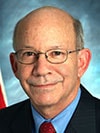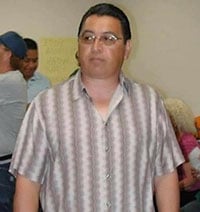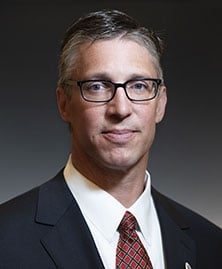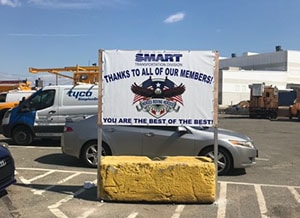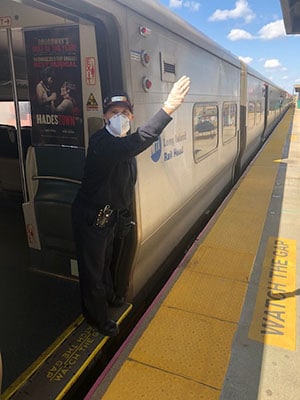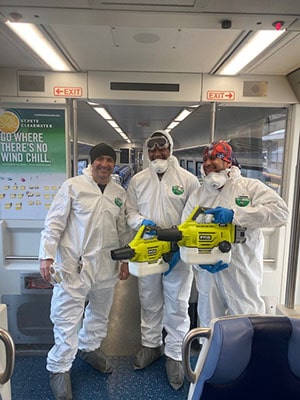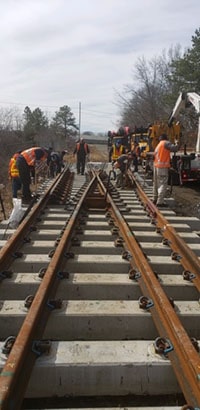After nearly four decades of service to members and numerous administrations in various roles in both SMART Transportation Division’s Public Relations and President’s Department, Senior Administrative Assistant to the President John Horvath is calling it a career.
“John has certainly left an enduring mark on how this union has been run,” said SMART Transportation Division President Jeremy R. Ferguson. “His experience as a communicator and his constitutional expertise provided a great depth of institutional knowledge. He’s going to be missed tremendously.”
Horvath started out with the then-United Transportation Union on Jan. 5, 1981, in the Public Relations Department after getting a journalism degree from The Ohio State University. For 14 years in the department his special focus was on the alumni program, including multiple rebrandings. He also helped produce communication vehicles for the union, including the UTU News and UTU calendars, through five presidents’ administrations — from Fred Hardin to Paul C. Thompson, always focusing on members’ stories and what mattered most to them.
“In my own past, I had some difficult jobs – I saw the need for dignity and a fair shake for the worker,” Horvath said. “I felt it was the ideal job for me. I wasn’t looking for a job, I was looking for a career, and that’s what I got.”
In 2007, he moved on to the President’s Department where his primary focus became the union’s constitution. His communications role already had allowed Horvath to acquire in-depth knowledge about union operations, and it was easy for him to adjust to the new role.
On the cutting edge of organizational functions in the President’s Department, Horvath was able to provide steady guidance to his co-workers across multiple departments. When confronted with a question regarding Local governance, Horvath always was able to provide the evidence to resolve the situation with his trusty copy of the constitution at hand, occasionally with the flair of an orator.
“John is a brilliant person and working with him was a valuable experience. I was truly fortunate to have someone so knowledgeable to learn from,” said Ralph Leichliter, an administrative assistant in the President’s Department, who worked alongside him. “He truly cares about our members and set high standards for the support we provide. I look forward to continuing our friendship and I wish him a retirement that’s as gratifying as his years here at SMART.”
“I am very fortunate to have had the opportunity to learn from John, and I am honored to have worked alongside him for the last five years” said Administrative Assistant Jeff Brandow. “His passion for the union labor movement and his dedication to our members is absolute, and I am certain that many of our members will agree when I say we owe John a debt of gratitude for imparting some of his knowledge to us. It’s going to be quite an adjustment not having him in the office every day.”
In retirement, Horvath said he has no immediate plans other than to spend time with his wife of 37 years, Cheryl, and to continue to play guitar as long as his health allows — he’s been known to gig around the Cleveland area on occasion.
The SMART Transportation Division wishes John the very best and a long, happy and healthy retirement.
Author: bnagy
Demetrios Vatistas, secretary and treasurer for SMART Transportation Division Local 281 (Milwaukee, Wis.), discussed working as a Metra conductor during the coronavirus pandemic with a Chicago-area newspaper.
Vatistas has been S&T for his local since February 2019 and a TD member since 1997.
“I’ve been doing this for 24 years, and I’ve never seen anything like this,” Vatistas told Daily Herald of Arlington Heights, Ill., reporter Marni Pyke. “It is extremely weird. We’re so used to working hand-in-hand, side-by-side. This is our family away from home.”
But there is a sense of anxiety when reporting for and performing service these days, especially when boarding what can only be described as ghost trains, Vatistas said.
Metra ridership has fallen a staggering 97% since a stay-at-home order was enacted by Illinois’ governor in March, but Vatistas said that new bonds are being formed, albeit at a safe social distance.
“I see concern, but I also see compassion,” Vatistas told Pyke.
Read the full story from the Daily Herald.
I wanted to send out another update on what is going on at the agency. We have received inquiries regarding Pandemic Unemployment Assistance (PUA) that was established under the CARES Act and whether railroaders may be eligible for benefits under that program if they are not eligible for Railroad Unemployment Insurance Benefits (RUIA) benefits. The Department of Labor (DoL) is responsible for giving guidance to the states regarding the PUA benefits, so we asked the Railroad Retirement Board’s (RRB) General Counsel to reach out to the DoL. The RRB’s General Counsel has been advised by the DoL that nothing in the PUA provisions prohibit railroaders from being eligible for these benefits if they otherwise qualify. Similarly, the RRB’s General Counsel has found that there is nothing in the RUIA that prohibits railroaders from receiving PUA benefits if they are not receiving RUIA benefits. So as a result, I would recommend that if your members have been denied RUIA benefits, they check with their state unemployment services to see if they are eligible for PUA benefits. To find out the application process in each state, you can refer workers to the Unemployment Benefit Finder at the following website:
https://www.careeronestop.org/LocalHelp/UnemploymentBenefits/Find-Unemployment-Benefits.aspx.
Though not related to COVID-19, I wanted to inform you of a new hire at the RRB. As you may remember from previous updates, the Board has been trying to hire a Chief Medical Officer. A new CMO, Dr. Elizabeth Bonson, has been hired and starts today. We hope that the CMO’s presence at the agency will help make the disability process more efficient.
Finally, as you know, the RRB is located in Chicago and this week, the governor of Illinois extended the stay-at-home order through May 30. I anticipate that the agency headquarters will continue to primarily work remotely. Regarding the field offices, although not all states have the same limitations as Illinois, at present it is my recommendation that it is in the best interests of agency personnel and the railroad population we serve to maintain the current work environment for all offices. Consequently, for the time being, field offices will remain closed to the public and staff will work remotely with periodic visits to the office for administrative tasks.
John Bragg,
Labor member, Railroad Retirement Board
SMART General President Joseph Sellers Jr. and SMART Transportation Division President Jeremy Ferguson as well as dozens of unions, business groups, economic justice organizations, and local transit advocates from across the nation wrote today to Vice President Mike Pence and Dr. Deborah Birx, coordinator of the White House Coronavirus Task Force, demanding better federal coordination to provide personal protective equipment (PPE) for transit workers.
As of this week, the coronavirus has claimed the lives of nearly 100 transit workers in the United States.
The victims include Scott Ryan, 41, a bus operator at Community Transit in Snohomish County, Washington; Patrick Patoir, 57, an MTA worker in New York for 33 years; Jason Hargrove, 50, a Detroit bus operator; Eugenia Weathers, a school bus driver in Lexington, Kentucky; and SMART-TD Local 61 member Michael Hill, a conductor and 30-year SEPTA veteran in Philadelphia.
The federal government can and must take stronger steps to prevent such loss of life.
Bus and train operators, maintenance workers, and cleaning staff at transit agencies around the country are putting their lives on the line as they enable essential travel for millions of Americans, ensuring the continued provision of food, medical care, and other basic goods and services during the COVID-19 pandemic. Without strong federal coordination to procure PPE for transit workers, they face needless risks on the job.
Based on guidance from infectious disease experts, the organizations demand the White House coordinate provision of N95 masks and other protective gear for frontline transit workers whose duties put them in close proximity to passengers, or require exposure to hazardous disinfectants. The groups also urge the CDC to issue stronger guidance for transit agencies, including recommendations on how to ventilate transit vehicles to minimize the risk of COVID-19 transmission.
These measures must be put in place to protect the transit workforce, which in turn will strengthen the overall effort to control the pandemic and minimize the spread of COVID-19. Nearly 3 million Americans classified as essential workers typically commute on transit, according to a TransitCenter analysis of U.S. Census data.
Protective gear for transit workers will have a strong multiplier effect, since reducing risk will increase the availability of the transit workforce, leading to greater provision of transit service, less crowding on transit vehicles, and lower rates of transmission among transit riders and thus the general population.
The alliance signing on to the letter reflects the broad public interest in protecting transit workers, encompassing labor, business, transportation, economic justice, environmental, and community-based organizations from dozens of states.
Supply chain issues affect every industry seeking protective gear. However, the need for transit workers is so urgent, and the consequences of further delay so dire, that federal action must be pursued as soon as possible. These protections will save the lives of transit workers, as well as the lives of nurses, doctors, food distribution workers, and other essential workers who rely on transit.
“Transit workers deserve every protection the government can muster,” said TransitCenter Executive Director David Bragdon. “Better coordination and provision of equipment will protect the health of hundreds of thousands of transit workers, and keep millions of other workers safe on their way to essential jobs.”
Read the entire letter here.
Members of Local 23 in Santa Cruz, Calif., are mourning the passing of Transportation Division retiree Domingo Tovar on April 14 from COVID-19.
He served a year as secretary and treasurer for Local 23.
“He had many friends. He was a happy person,” said retired Local 23 member Serena Tovar, Brother Tovar’s wife of more than 43 years and a 30-year SMART-TD member. “Domingo remained the same type of person the day she met him to the day he passed. He was always happy. He just loved life and had no regrets. He was very proud of his kids and was always there for his family.”
Brother Tovar retired in 2016 after 29 years of continuous union service. Transportation was in his blood, though — he had begun driving at age 25, had driven charter buses and had even obtained his pilot’s license. After his Santa Cruz Metro retirement, he kept working as a shuttle bus driver for the University of California — Santa Cruz until his passing.
He was remembered fondly by Local 23 brother Mario Espinoza.
“I could confide in Domingo about any issue and l knew that what we talked about always stayed between us,” said Espinoza, who worked alongside Brother Tovar for years. “Domingo was someone you could trust.”
Brother Espinoza said that his and Brother Tovar’s families became close over the years as they continued to work together and that Domingo was generous with his time and his technical expertise that bailed out co-workers many times.
“He was very helpful with a number of drivers that had problems with their computers, phones or any electronic device. He would solve the issue in no time or give you advice on resolving the issue,” Espinoza said. “He never wanted anything in return. His satisfaction was you being happy your problem was solved.
“He was just beginning to enjoy his retirement when this virus took his life. I am still in shock and can’t comprehend this and will take some time to cope with this,” Espinoza said. “So with a heavy heart l say, Domingo, you will be missed. Rest in peace, brother.”
In addition to his wife, Serena, Brother Tovar is survived by a daughter, Mandy; son, Damien; and two grandchildren — Damien and Sasha Tovar Page.
Arrangements have been made to have bulk quantities of facemasks for order through American Products Inc., an endorsed SMART Transportation Division vendor.
Two style options are available – one with a washable filter insert and a second single-layer cloth mask.
These are customizable and available in minimum quantities of 50 from the vendor. Contact Sherry Schirripa (sschirripa@comcast.net) or Vicki Harrington (vharrington@atc-ny.com) if interested in placing an order.
Visit smarttdmerchandise.com for more information.
Railroad Retirement benefit recipients who have a qualifying child and didn’t file a 2018 or 2019 tax return have a limited window to register to have $500 per eligible child added automatically to their soon-to-be-received $1,200 COVID-19 payment, the Internal Revenue Service said Monday.
A quick trip to a special non-filer tool on IRS.gov by noon Eastern time, Wednesday, April 22, may help put all of their eligible Economic Income Payment into a single payment, the agency said in a news release.
“We want to ‘Plus $500’ these recipients with children so they can get their maximum Economic Impact Payment of $1,200 plus $500 for each eligible child as quickly as possible,” said IRS Commissioner Chuck Rettig. “They’ll get $1,200 automatically, but they need to act quickly and register at IRS.gov to get the extra $500 per child added to their payment. These groups don’t normally have a return filing obligation and may not realize they qualify for a larger payment. We’re asking people and organizations throughout the country to share this information widely and help the IRS with the Plus $500 Push.”
If the Wednesday deadline is missed, RRB beneficiaries who don’t normally file a tax return and do not register with the IRS by April 22, will still be eligible to receive the separate payment of $500 per qualifying child. Their payment at this time will be $1,200 and, by law, the additional $500 per eligible child amount would be paid in association with a return filing for tax year 2020. They will not be eligible to use the Non-Filer tool to add eligible children once their $1,200 payment has been issued, the IRS said.
To read the full IRS release, please follow this link.


